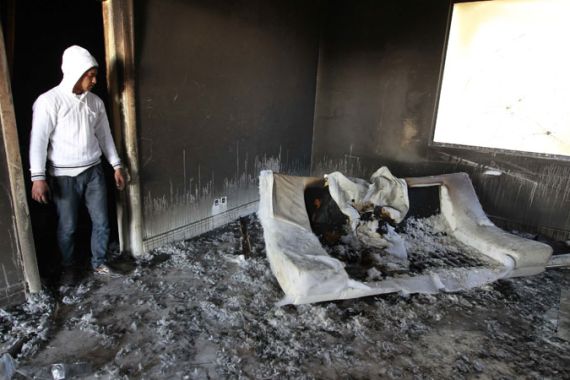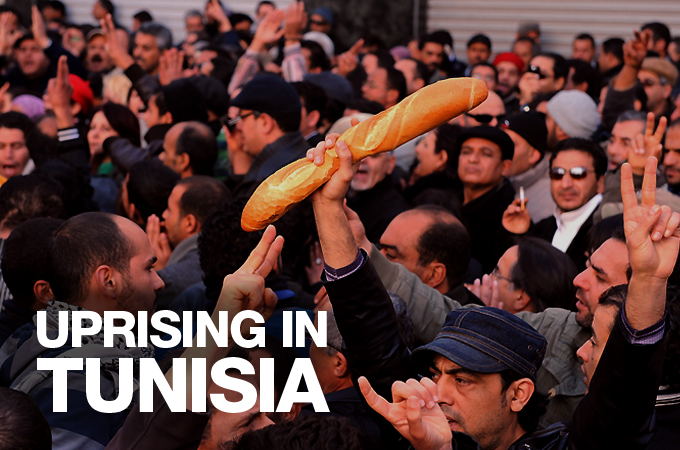‘The Family’ Tunisians hate most
Central bank denies that ousted leader’s wife took tonnes of gold out of the country when they fled.

 |
| After Ben Ali and his family fled the country, some of their homes and properties were ransacked and burnt [Reuters] |
Tunisia’s central bank has denied a report that relatives of the ousted leader Zine El Abidine Ben Ali fled the country with 1.5 tonnes in gold.
The gold would fetch $65m in the open market at Monday’s prices.
France’s Le Monde newspaper reported on Monday that president Nicolas Sarkozy’s office was briefed by French intelligence that Leila Trabelsi, Ben Ali’s second wife, withdrew gold ingots from the Tunisian central bank last week.
The governor initially resisted her request, but backed down under pressure from Ben Ali himself, the report said.
An official at the bank in Tunis told the AFP news agency that the “gold reserves of the central bank of Tunisia have not been touched in recent days”.
“Neither have the cash reserves. The country has very strict regulations,” the unnamed official said.
The end of president Ben Ali’s 23-year rule brought joy to many ordinary people, who were especially elated at the prospect of life without his wife and her notorious family.
Gold-digger?
The family of former first lady Leila Trabelsi, a one-time hairdresser who rose to become Tunisia’s most influential woman, was widely despised as the ultimate symbol of corruption and excess.
 |
Trabelsi and her 10 siblings are reported to have operated like a mafia, extorting money from shop owners, demanding a stake in businesses large and small, and divvying up plum concessions among themselves.
Their control over the North African country’s economy was vast.
The Trabelsi and Ben Ali’s own families were said to have a stake in Tunisian banks and airlines, car dealerships, Internet providers, radio and television stations, industry and big retailers.
And when mass protests forced Ben Ali to flee to Saudi Arabia, the peoples’ pent-up rage was directed more at Leila’s side of the family than at her husband and his authoritarian government.
Retribution was swift.
Within a day of Ben Ali’s departure, many of the villas and businesses belonging to the Trabelsis were pillaged and burned, and some reports said one prominent family member was killed by an angry mob.
A branch of the Zeitouna bank in Tunis founded by Ben Ali’s son-in-law was torched, as were vehicles made by the car brands he distributed, including Kia, Fiat and Porsche.
“They (the Trabelsis) are thieves, tricksters and even killers,” Mantasser Ben Mabrouk, a Tunis resident, said.
“Their only goal was to make money in whatever way they could.”
‘Absolutely capital’ role
US diplomatic cables released by WikiLeaks appear to back up that allegation.
A June 2008 cable from the US Embassy in Tunis describes a report by anti-corruption group Transparency International saying: “Whether it’s cash, services, land, property … President Ben Ali’s family is rumoured to covet it and reportedly gets what it wants.”
The economic fallout of the Trabelsis’ web of corruption and influence-mongering was palpable, the cable said, with “Tunisian investors – fearing the long-arm of ‘the Family’ – forgoing new investments, keeping domestic investment rates low and unemployment high.”
A lack of jobs in this highly educated nation fuelled the month of popular protests that toppled Ben Ali.
The co-author of a book on Leila Trabelsi, “La Regente de Carthage,” said that the Trabelsis played an “absolutely capital” role in the fall of the regime.
“Tunisians were absolutely aware of what they were up to and they got to a point where they were sick and tired of their behaviour,” said author Catherine Graciet.
Still, she noted that “we can’t put all the blame on the Trabelsis, because it was Ben Ali himself who allowed them to act that way.”
Trabelsi married Ben Ali in 1992, five years after the bloodless palace coup in which he replaced ageing independence hero Habib Bourguiba as president.
The marriage – which was also Ben Ali’s second – catapulted the once-modest Trabelsi clan to national prominence.
Her oldest brother, Belhassen, known as the clan chieftain, is said to have ruled over the family’s many mafia-style rackets.
Family attacked
Her nephew, Imed Trabelsi, was reputed to be the spoilt brat of the family and the former first lady’s favourite, according to the book.
Known as a playboy, he enjoyed a jet-set lifestyle, complete with a garage full of sports cars and yachts.
French prosecutors suspected him and another of Leila Trabelsi’s nephews of having ordered the 2006 theft of a yacht belonging to a French investment banker that turned up in the Tunisian port of Sidi Bou Said.
He was reported to have been stabbed by a fisherman in the town where he was mayor, an upscale coastal town near the capital, and died from his wounds at a Tunis military hospital over the weekend.
The whereabouts of all family members was unclear.
France, which ruled Tunisia as a protectorate until it won independence in 1956, said some Ben Ali relatives were in France but they were “not welcome” to stay.
Media reports had them at a hotel near the Disneyland Paris resort.
Asset freeze
French government spokesman Francois Baroin also said France had taken “the necessary steps” to block any suspicious movement of Tunisian assets linked to Ben Ali and his entourage that might be squirrelled away in France.
Meanwhile, a Swiss lawyer filed a request to freeze any assets held by Ben Ali in Switzerland.
Ridha Ajmi told the AFP news agency that he also asked for international arrest warrants against Ben Ali, his wife Leila Trabelsi and former interior minister Rafik Bel Hadji Kacem, claiming they had been involved in ordering police to open fire on protestors.
“We are asking for a criminal inquiry to determine whether or not funds that belong to the Tunisian people have been diverted… to private accounts or companies.”
He also confirmed a formal request for an arrest warrant, saying that “about 100 Tunisian people died including a Swiss citizen”.
A government spokesman told AFP that it was keeping watch on the situation and that “no decision has been taken on this matter”.